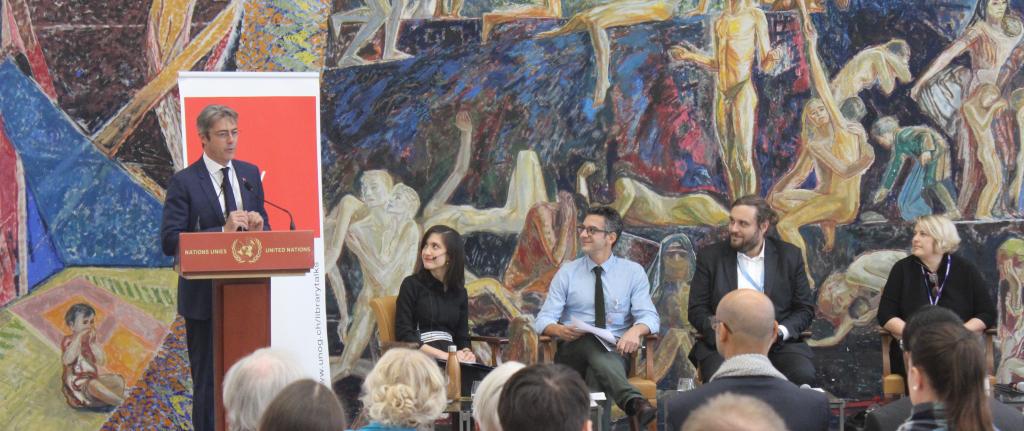Can you tell us more about this meeting? What was its purpose and what was it meant to achieve?
The purpose of this meeting was about exploring what, if, when, why and how history plays a role in policy-making.
Is it indeed the case that history is neglected?
Neglected is hard to say. Policy-makers from all over the world and in different epochs have shown a sensitivity and sensibility to history, or openly appreciated history as a discipline. Many others interpreted the past (not necessarily history) in their own ways, including in nationalist, racist or imperialist ways. So, if historians, professional historians, have been neglected, that is not necessarily the case for history per se.
To my knowledge, professional historians have not been prominent among the members of decision-makers’ teams at both the national and international level. And that is something we clearly see, especially when we realise basic factual mistakes policy-makers made and make, or the lack of adequate historical contextualisation of some of their measures or policies.
What role can it actually play in policy-making?
We live in an era when access to information (some information, that is) depends on how fast and powerfully you can scroll down or up your mobile phone and other electronic devises. History offers to policy-makers and the public who wish to listen to it or wishes to read about it a different perspective: knowledge, rather than fast-consuming information. Rather than quantity history privileges quality. Rather than shallow, horizontal information, history offers in-depth and/or transversal reflections and analyses.
Simply because history gives context, it provides policy makers with some tools in their toolbox to make sense of what is going on. Historians give meaning (subjective meaning) and interpret the intertwining of times and spaces at specific junctures offering to policy-makers (and any other reader) the possibility of better grasping the present and take appropriate, informed decisions concerning the future. In some cases, according to certain sensibilities and sensitivities, history is a little bit like one’s conscience. To some policy-makers history looks a little bit like Pinocchio’s Talking Cricket. In the fairy-tale by Carlo Collodi, Pinocchio kills the Talking Cricket. I am fully aware that policy-makers do not need historians and can use history without historians. Contrary to other disciplines, history does not belong to historians – and everybody can claim to know history or of making history… The discipline is very prone to be abused. This may be one of the reasons why history or, rather, historians are neglected by policy-makers. They can write their own history. Victorious powers have written their history and have imposed them.
How does this translate in teaching and research?
The meeting at the UN was not an affair to glorify history and historians. Rather it was a much more in-depth conversation. There are plenty of examples of bad historians and bad history. If you think about twentieth century historians who joyfully joined Stalinism, Nazi or Fascist regimes and of many others that gave up their most precious asset: independent, critical thinking. I pointed out that a substantial difference exists between working for state-agencies and/or international institutions and collaborating with these institutions as independent, external actors.
Students who wish to become professional historians are generally a minority. Many of our students, certainly our Master students and our inter-disciplinary students love history but will become either policy-makers or will work for the public or private sector, as diplomats or for international organisations or non-governmental organisations. They are perfectly aware of how to use history; they have that tool in their toolbox, among many others. They are also aware of a variety of examples of how history can be abused. In our seminars and courses in the International History Department at the Graduate Institute, we provide them with multiple examples of the uses and abuses of history, and of how our discipline has been instrumentalised, manipulated or ignored.
As far as research is concerned, history contrary to most social sciences, does not seek for objectivity. We are fully aware about the subjective nature of our findings and of writing history. We do care about being rigorous in the cross-referencing of our sources. This analytic precision shapes our work, and in the end whether or not readers trust us. Contrary to what some policy-makers might think, historians are perfectly capable of contextualising present situations and of offering knowledge to policy-makers on current events, including climate change, terrorism, the end of democracy, new waves of racisms or unfolding humanitarian or financial crises.
Finally, the questions that the public asked revolved around big data, algorithms and digitisation of archives including open access. These are recurrent themes and issues we keep discussing with our students. I believe that many aspects of our research will change in the next ten years; and many aspects of the dissemination of our work will change too. For all these reasons, bridges between policy-making worlds and historians should be created and exchange should be facilitated, since we offer a public service. Having said that, the respect of everybody’s role and responsibility is in my view sacrosanct. Policy-makers must take on the responsibility to decide; they will decide whether to ignore or manipulate history or make sensible use of historians’ analyses. In turn, historians must accept to be ignored and have to keep putting forward their independent and critical views, being aware that, like the Cricket, they can be the first against the wall.



